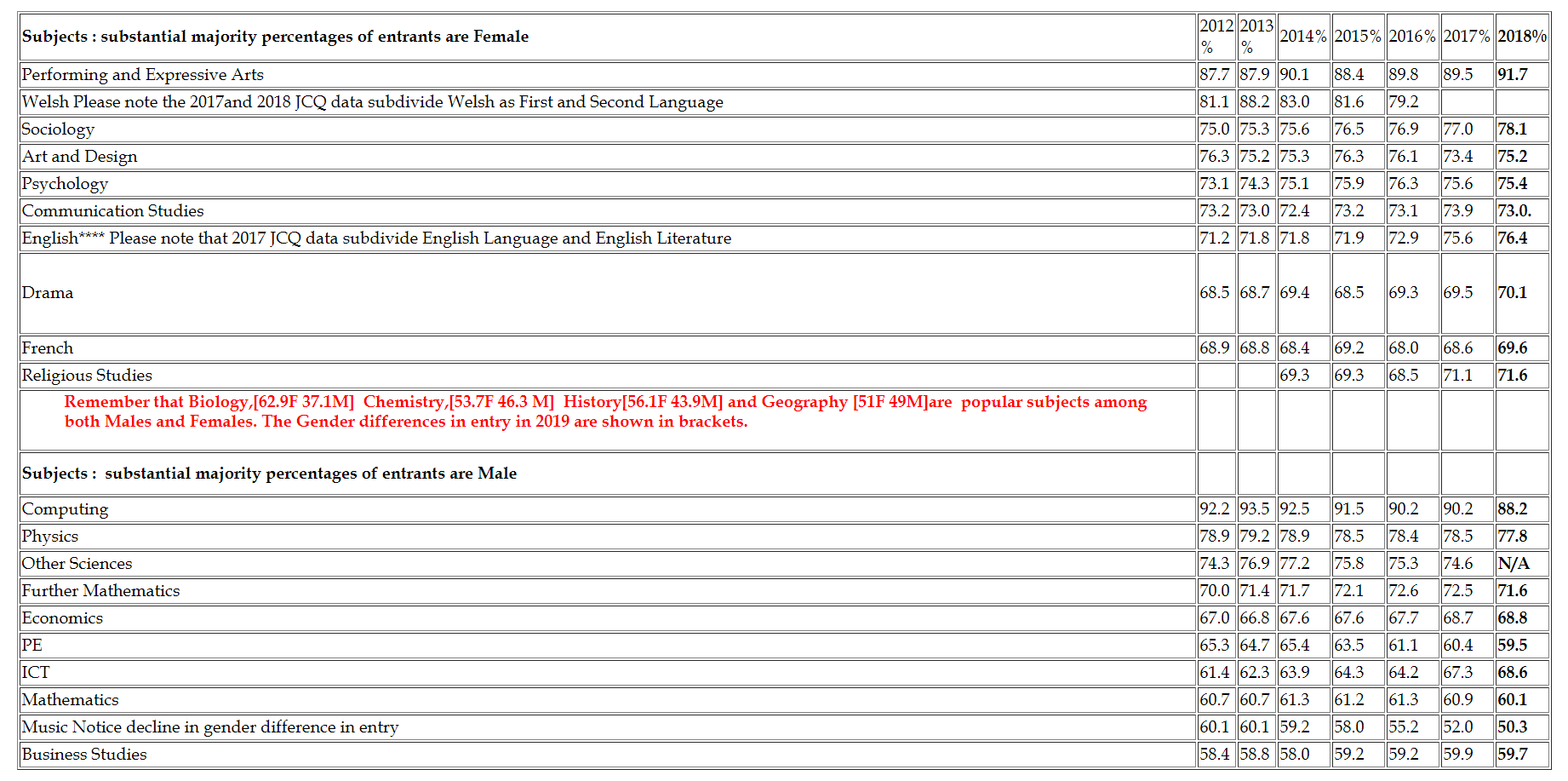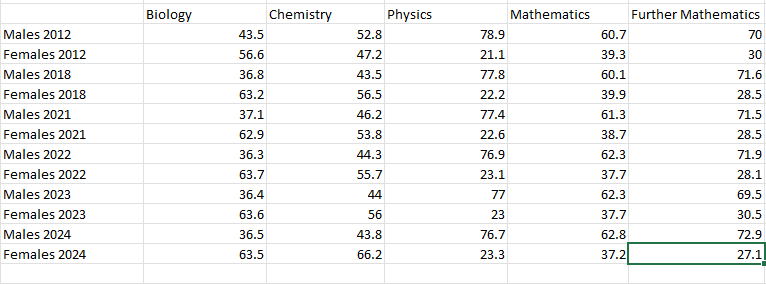Russell Haggar
Site Owner
Section 3[b]
2.GCE Advanced Level : Gender Differences in Examination Entries

Between 2008 and 2019 there has not been much change in the relative popularity of the 10 most popular subjects.
Between 2008 and 2019 there has not been much change in the relative popularity of the 10 most popular subjects.
Click here for Trends in A Level subject choice up to and including 2024
Click here for a very useful article from fft educationdatalab which provides full data on gender differences in subject choice at GCE Advanced Level for English students in 2021 with annual comparisons from 2017 to 2021.
Click hereand on other results information then on A Level on Other Results Information for detailed information from the Joint Commission for Qualifications. Full subject Entry and results data are provided for the UK and for England, Northern Ireland, and Wales and for 18-year-olds and all students. Very full data on trends in the overall popularity of A Level subjects is provided in the GCE Trends Summer 2024 and you can find a useful graphic on Gender and A Level Subject Choice in GCE Entry, Gender, and Regional Charts Summer 2024
The Guardian present JCQ data for England rather than the UK in this article for the yeas 2017-2024 showing changes in the relative popularity of the main A Level Subjects. The article also shows that between 2012 and 2024 in the aggregate Stem subjects and Social Science subjects have become more popular while the popularity of the Humanities has declined significantly, and the popularity of Arts subjects has declined slightly.
It is also recognised that although the popularity of the Social Sciences has increased in the long term their popularity did fall between 2023 and 2024 due mainly to the fall in popularity of Sociology and Economics although both Sociology and Economics had become increasingly popular prior to 2023-2024.
The 10 Most Popular GCE Advanced Level Subjects for Males and Females 2014, 2022 and 2023
| Males 2014 | Males 2022 | Males 2023 | Females 2014 | Females 2022 | Females 2023 |
| Mathematics | Mathematics | Mathematics | English | Psychology | Psychology |
| Physics | Physics | Physics | Psychology | Biology | Biology |
| Chemistry | Chemistry | Economics | Biology | Mathematics | Mathematics |
| Biology | Biology | Biology | Mathematics | Chemistry | Sociology |
| History | Economics | Chemistry | Art and Design | Sociology | Chemistry |
| English | Business Studies | Business Studies | History | Art and Design | Art and Design |
| Economics | History | History | Chemistry | English Literature | English Literature |
| Geography | Psychology | Psychology | Sociology | History | History |
| Business Studies | Geography | Geography | Religious Studies | Geography | Business Studies |
| Psychology | Computing | Computing | Geography | Business Studies | Geography |
You may Click here for the 2024 data.
See below for more details on gender differences in GCE Advanced Level subject choice in 2014, 2022 and 2023.
For each year there are 3 charts: 10 most popular subjects overall; 10 most popular subjects for females; 10 most popular subjects for males]
Click here to download EXCEL Charts showing the 10 Most Popular GCE Advanced Level Subjects in 2014 with percentages of Male and Female entrants for each subject.
Click here to download EXCEL Charts showing the 10 Most Popular GCE Advanced Level Subjects in 2021with percentages of Male and Female entrants for each subject.
Click here to download EXCEL Charts showing the 10 Most Popular GCE Advanced Level Subjects in 2022 with percentages of Male and Female entrants for each subject.
Click here to download EXCEL Charts showing the 10 Most Popular GCE Advanced Level Subjects in 2023 with percentages of Male and Female entrants for each subject.
Click here to download Gender differences in Examination Entries and Pass Grades in GCE Advanced Level STEM subjects in 2021 and 2022 and 2023 The definition of STEM subjects is, however, problematical.
Click here to download EXCEL Charts showing the 10 Most Popular GCE Advanced Level Subjects in 2024 with percentages of Male and Female entrants for each subject.
Click here to download for Gender differences in Entries and Results for GCE Advanced Level Stem Subjects 2021=2024
Gender and GCE Advanced Level Subject Choice 2012 -2024: Some Further Analysis: Gender and Subjects with fewer total entries.
In this table are listed the 10 subjects with the largest percentages of female and male entrants respectively in 2012-18 and the percentages of female entrants and male entrants respectively in these subjects in 2012-2018. It is shown that these percentages vary little in most subjects between 2012 and 2018 although there are some minor changes in the rank order some subjects among females. [Also, in the cases of Welsh and Performing and Expressive Arts the fluctuations in the percentages are greater but this is related to the fact that actual numbers choosing some of these subjects are very small.

Click here and then on Examination Results and then on Other Results Information then scroll down to GCE, Gender Entry and Regional Charts to access the 2024 Results
Males, Females and STEM Subjects 2012-2024
- Much has been made of the gender differences in choice of Biological Sciences, Chemistry, Physics, Mathematics and Further Mathematics and so it is appropriate to provide a little more information on these subjects. The following table illustrates the percentages and numbers of all UK male and female entrants for the years 2012-2022
- In relation to these data remember also that gender differences in GCSE A*-C pass rates in these subjects are small and so cannot explain the significant gender differences in Advanced level entry rates for all of these subjects [other than Chemistry]
- The Female entry rate for Biological Sciences has consistently been higher than the male entry rate and this has also been the case for Chemistry from 2017 to 2022.
- However, in Physics, Mathematics and Further mathematics the male entry rate has consistently been higher than the female entry rate.
- Click here for a Guardian article by Professor Athene Donald [Professor of Physics at Cambridge University] in which she discusses the implications of the Institute of Physics Report.
Gender, The Sciences and Mathematics 2012- 2024

Click here for a Guardian article [2019] which indicates that in 2019 for the first time ever the number of female entries in A Level Biology , Chemistry and Physics combined exceeded the male entry rate for these subjects and this has continued in 2020 and 2021 and 2022.
However, in Physics, Mathematics and Further mathematics the male entry rate has consistently been higher than the female entry rate. If these trends continue, we shall not see equal numbers of males and females opting for Physics, Mathematics and Further Mathematics any time soon
- Click here for very useful BBC item: Which subjects are students dropping?
- Click here To Download STEM Data taken from WISE/JCQ which illustrate gender differences in GCE Advanced Level entry rates in the 9 subjects which WISE define as STEM subjects